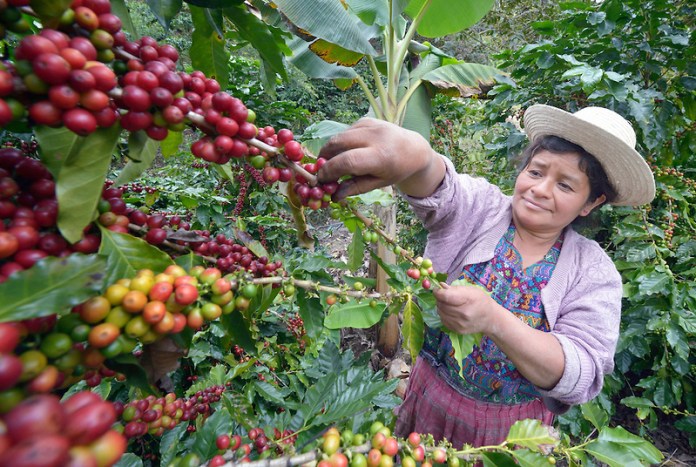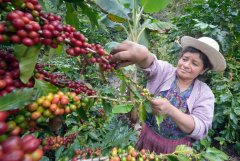Spend 70% of our labor just to make a cup of coffee in our hands-- the great her.

Professional barista communication, please pay attention to coffee workshop (Weixin Official Accounts cafe_style )
Is Fair Trade Coffee Fair?
As coffee consumption increases, more and more people are concerned about exploitation in the coffee market. The rise of Fairtrade coffee allowed small coffee farmers to earn a "guaranteed purchase price" and continue to make a living, and thus continue to operate.
And with that comes more scrutiny and questioning of fair trade, like Connor. Woodman's worry in unfair trade is that these fair-trade labels will eventually become nominal marketing tools and moral stickers.
(Photo source: Bios)
Gender has also been gradually brought into the scope of discussion. The situation of female workers has long been concealed under the collective term of workers. Fair trade is not really fair. In fact, there is a huge gender gap in agricultural industry in developing countries.
Female workers "high output, low income"
It may be hard for us to imagine that women are the main source of agricultural labor in developing countries; they spend a lot of time in charge of most production and processing operations. But because men hold most of the property and land ownership, they often get only 10% of the income, which is completely disproportionate to the labor force.
This is particularly true in the coffee industry, where women do more than 70% of the production and distribution work, but actually own less than 20% of the coffee resources (whether land, income or company ownership).
While Fair Trade is bringing light to the coffee market, there are still so many people who are invisible and unable to benefit.
(Image source: thefrogblog)
Coffee produced by female workers
CAC Manager, Esperanza (Photo credit: taylorscoffee)
In order to improve this phenomenon, CAC (Cooperativa Agraria Cafetalera Pangoa) in Peru began to advocate buying coffee grown by women, and then investing the money earned in industrial equipment and projects, giving back to growers, and combining multiple crops to increase production to attract more international buyers. CAC, which is mostly run by women, has also set up a unit dedicated to women's development.
CAC's running voice made this issue jump to the world stage and be reflected and discussed by everyone.
The coffee industry is just a drop in the ocean. There are gender imbalances in all aspects of life, but the differences are large and small, and they are ignored or ignored. It is still a long way to go to close this gender gap.
Dear Editor:
"Fair Trade is Unfair" They spend 70% of their labor to make a cup of coffee in our hands. The first paragraph of the article, which is translated and translated from the original article, points out the first paragraph of the text by enthusiastic workers engaged in fair trade, causing readers to misunderstand "fair trade". The first paragraph of the article means: "Gender is gradually brought into the scope of discussion, and the situation of female workers has long been concealed under the collective term of workers; Fair trade is not really fair. There is a huge gender gap in agriculture in developing countries." After re-examination by the editorial department, it did cause trouble for fair trade workers and misinterpretation of gender imbalance in fair trade organizations by readers.
CAC is also a fair trade organization. They see gender differences in income, but they do not directly address whether fair trade organizations have gender issues. The editorial department compiled this article with a positive attitude, in order to focus on the audience's attention to fair trade workers and their concerns, but the introduction outside this compiled article is indeed inappropriate in terms of text, and here again, I apologize.
I hope everyone will pay attention to the development of fair trade
and make fair trade fairer.
::: Original compiled text, except for title correction, the editorial department of the original text retains its presentation history without modification: ::
Important Notice :
前街咖啡 FrontStreet Coffee has moved to new addredd:
FrontStreet Coffee Address: 315,Donghua East Road,GuangZhou
Tel:020 38364473
- Prev

Spend 70% of our labor just to make a cup of coffee in our hands-- the great her.
Professional baristas exchange please follow the coffee workshop (Wechat official account cafe_style) Fair Trade Coffee is fair? With the increase in the number of people who drink coffee, more and more people are concerned about the exploitation of the coffee market. With the rise of Fairtrade coffee, small coffee farmers can get a guaranteed purchase price and continue to make ends meet. With it, there are more.
- Next

Beiluoyi Coffee Shop 12 Beer Coffee Shop is full every day
Professional baristas Please follow the Coffee Workshop (official Wechat account cafe_style) Wuluoyi Coffee Shop has been opened with up to 12 beer women, the coffee shop is almost full every day, and business has soared by 30% in the past two years! The coffee shop is located on the ground floor of Block 59 on the upper section of Changi Road. When the reporter visited the scene, an employee, who spoke on condition of anonymity, revealed that the coffee shop had opened since its opening.
Related
- Can lightly roasted coffee beans be used to extract espresso? How finely should you grind high-quality coffee beans to make Italian latte?
- What is the difference between the world's top rose summer coffee and Yejia Shefi? What are the flavor characteristics of Yega Shefi coffee and Panama rose summer?
- The ceremony is full! Starbucks starts to cut the ribbon at a complimentary coffee station?!
- A whole Michelin meal?! Lucky launches the new "Small Butter Apple Crispy Latte"
- Three tips for adjusting espresso on rainy days! Quickly find the right water temperature, powder, and grinding ratio for espresso!
- How much hot water does it take to brew hanging ear coffee? How does it taste best? Can hot water from the water dispenser be used to make ear drip coffee?
- What grade does Jamaica Blue Mountain No. 1 coffee belong to and how to drink it better? What is the highest grade of Blue Mountain coffee for coffee aristocrats?
- What are the flavor characteristics of the world-famous coffee Blue Mountain No. 1 Golden Mantelin? What are the characteristics of deep-roasted bitter coffee?
- Can I make coffee a second time in an Italian hand-brewed mocha pot? Why can't coffee be brewed several times like tea leaves?
- Hand-brewed coffee flows with a knife and a tornado. How to brew it? What is the proportion of grinding water and water temperature divided into?

